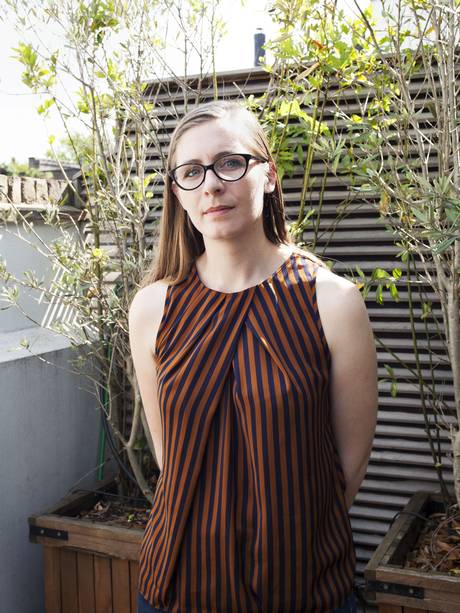from guardian uk
Eleanor Catton made Man Booker prize history twice on Tuesday night the youngest winner for, at 832 pages, the longest novel.
The New Zealander was 25 when she began writing The Luminaries, an epic 19th-century gold rush murder mystery. Now 28, she also becomes an “end of an era” winner: the last recipient of a Booker prize which, for 45 years, has only allowed Commonwealth and Irish writers – next year, the Americans are coming.
This year’s chair of judges, the writer and critic Robert Macfarlane, admitted readers needed to make a “huge investment” in the doorstopping book; it is challenging with a slow start but the dividends were more than worth it.
“We have returned to it three times,” he said. “We have dug into it and the yield it has offered at each new reading has been extraordinary.”
Macfarlane said it took just under two hours for the judges to decide on the winner and there was no need for a vote. “There was pretty tough discussion, we put the novels to the test … and, at the end, we were all very happy.”
It was a pleasant judging process, he said. “I don’t want it to sound tranquil to the point of tranquillised because it wasn’t that. We brought pressures to bear on the novels but it was a very happy process.”
Catton’s novel easily set a new longest winner record, beating Hilary Mantel’s Wolf Hall, which was 672 pages long and AS Byatt’s Possession, at 624 pages.
Catton became only the second New Zealander to win after Keri Hulme in 1985 for The Bone People. It was also the first win for the publisher, Granta.
The novel had been up against the shortest work ever to be shortlisted: Colm Toibin’s 30,000 word novella The Last Testament of Mary and the bookies’ favourite, Jim Crace’s Harvest. Also missing out were Ruth Ozeki for A Tale for the Time Being; Jhumpa Lahiri for The Lowland and NoViolet Bulawayo for We Neen takes the youngest winner title from Ben Okri who was 32 when The Famished Road won the Booker prize in 1991.
But Macfarlane praised the maturity of the work. “You read every sentence and you are astonished by its knowledge and its poise,” he said. In a way, the winner is a classic Victorian novel with murder, red herrings, conspiracies and fallen women.”
Catton said hearing she was the winner was like hitting “a white wall”. She said: “I remember I’d written something down and it was in the depths of my handbag … I’ve just bought a new handbag because my old one wasn’t big enough to fit in my book.
“It’s a curious thing about writing a novel: you never see it until it’s finished. When I was nearing the end I started to get a sense that when I pressed save on my Word document it took an awfully long time. It wasn’t until I got a proof of the book I thought ‘jeepers this is quite big’.”
A key theme of the book is astrology. Catton, a Libra, admitted she had not checked her horoscope but there was a significant astrological aspect to her winning, as the last New Zealander to win was 28 years ago, an important astrological number – “it is the time that Saturn takes to orbit around the Earth.”
She joked: “I’m already sounding like a lunatic.”
The Luminaries is Catton’s second novel after The Rehearsal, which was shortlisted for the 2009 Guardian first book award.
The shortlist had been widely heralded as one of the strongest in years and was diverse in its subject matter and geographic span, from the English countryside to shanty town life in Zimbabwe.
But this year’s prize has been overshadowed by the announcement of a controversial rule change. Since 1969, when PH Newby was named the first winner, the Booker has been open only to citizens of the Commonwealth and Ireland but next year it will be open to anyone writing fiction in English. In essence, it means that US writers will become eligible: it becomes much more competitive.
The decision has sparked a literary storm. Those against the changes include Crace, the 2011 winner Julian Barnes and Philip Hensher, who wrote in the Guardian: “It seems quite baffling to many writers that a major prize that has so successfully promoted them should move its terms so radically and for no good reason.”
Hensher fears the Booker will become viewed as a minor American award, but the prize’s chairman, Jonathan Taylor, said a failure to change the rules would be like not allowing China into the Olympics. Helena Kennedy, a Booker trustee, said the current rules were like having the border control agency involved.
The widespread and denied suspicion is that the decision is a response to the creation of the Folio Prize for fiction, open to all fiction works written in English.
Catton wins £50,000, which was presented by Camilla, the Duchess of Cornwall, at a black tie dinner in London’s Guildhall.
Jon Howells, a spokesman for Waterstones, said another historical fiction was “great news for readers as this is a hugely enjoyable and compelling affair.” It is also “potentially the biggest seller on the shortlist and will now benefit massively from the Booker boost”.
The other judges this year were the biographer and critic Robert Douglas-Fairhurst, the writer and broadcaster Natalie Haynes, the BBC journalist Martha Kearney and the writer and critic Stuart Kelly.


